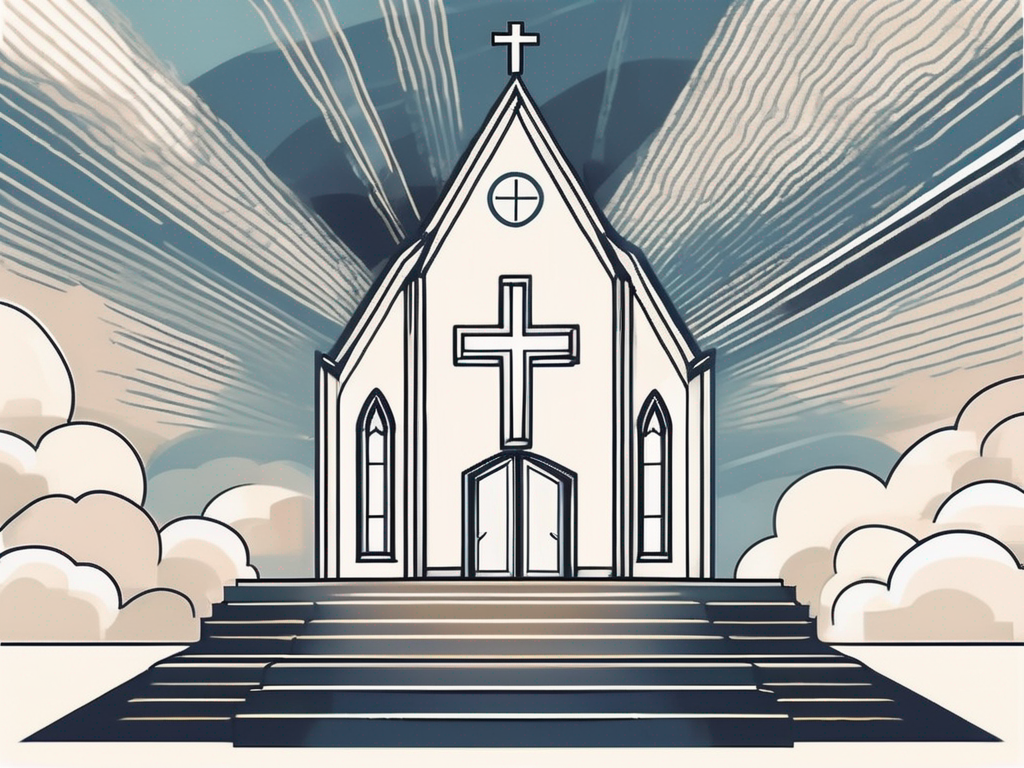Ascension Day is an important observance in the Christian faith that commemorates the ascension of Jesus Christ into heaven. It is celebrated on the fortieth day after Easter Sunday, which falls on a Thursday. This significant event holds deep meaning for Christians around the world, as it marks the completion of Jesus’ earthly ministry and his return to the heavenly realm.
Understanding the Significance of Ascension Day
Ascension Day holds a special place in Christian theology. It signifies the final act of Jesus’ earthly mission, where he ascended into heaven and took his rightful place at the right hand of God. This event demonstrates Jesus’ divine nature and his victory over death, symbolizing the culmination of God’s plan of salvation for humanity.
As we delve deeper into the significance of Ascension Day, it is important to explore the biblical basis for this momentous event. The ascension of Jesus is documented in the New Testament of the Bible, specifically in the books of Luke and Acts. In the Gospel of Luke, Jesus is described as leading his disciples to Bethany, where he blesses them and ascends into heaven. The book of Acts further elaborates on this event, emphasizing the disciples’ role as witnesses to the ascension.
Jesus’ ascension is closely linked to his resurrection and serves as a testament to his identity as the Son of God. It completes the cycle of his earthly ministry, from his birth to his crucifixion, resurrection, and ascension.
However, the significance of Ascension Day goes beyond its biblical narrative. Theological interpretations of this event vary within different Christian traditions. Some view it as the crowning moment of Jesus’ exaltation, where he is glorified and given authority over all things. This perspective highlights the majesty and power of Jesus as the Son of God.
On the other hand, some emphasize the significance of Ascension Day in paving the way for the coming of the Holy Spirit on Pentecost. The ascension is seen as a necessary step in the divine plan, allowing the Holy Spirit to descend upon the disciples and empower them for their mission of spreading the gospel to the ends of the earth.
Additionally, the ascension is also seen as a representation of Jesus’ role as the High Priest, who intercedes for humanity before God. This understanding highlights the connection between Jesus’ life on earth and his ongoing ministry in heaven. As the High Priest, Jesus continues to advocate for humanity, bridging the gap between God and humanity, and offering forgiveness and reconciliation.
Ascension Day, therefore, holds profound theological significance. It is a day of celebration and reflection, reminding believers of Jesus’ triumph over death and his continued presence in the heavenly realm. It serves as a reminder of the hope and assurance that Christians have in their faith, knowing that Jesus is not only their Savior but also their advocate and intercessor before God.
The History and Origin of Ascension Day
The roots of Ascension Day can be traced back to the early centuries of Christianity. It was formally recognized as a feast day in the fourth century, becoming an integral part of the liturgical calendar.
Ascension Day in the Early Church
During the early years of Christianity, Ascension Day was celebrated as part of the overall Easter season. It was a time of joy and rejoicing, as the Church commemorated the resurrection, ascension, and the promise of the Holy Spirit’s coming at Pentecost. The day also served as a reminder of Jesus’ continued presence with the disciples, even though he was physically absent.
As the early Church grew and spread, so did the observance of Ascension Day. It became an important milestone in the Christian faith, marking the culmination of Jesus’ earthly ministry and the beginning of a new era for his followers. The disciples, who had witnessed his resurrection and spent time with him after his death, now had to grapple with his physical departure. Ascension Day provided them with comfort and hope, assuring them that Jesus had ascended to heaven to be with God the Father.
Evolution of Ascension Day Celebrations
As the centuries passed, Ascension Day evolved into a distinct and significant observance within the Christian calendar. Various customs and traditions sprouted within different regions, giving rise to a rich tapestry of Ascension Day celebrations.
In some countries, such as Italy and Spain, processions are organized to reenact the ascension. Often, these processions involve statues or images of Jesus ascending into heaven. The faithful gather in the streets, following the depiction of Jesus’ ascent, and participate in prayers and hymns. This visual representation serves as a powerful reminder of the event and allows believers to engage with the story on a deeper level.
In other places, it is customary to gather in churches or open-air spaces for prayer, worship, and the reading of the relevant scripture passages. These gatherings provide an opportunity for the community to come together and reflect on the significance of Jesus’ ascension. Through songs, sermons, and communal prayers, believers strengthen their faith and find solace in the shared experience of celebrating this important day.
Certain regions have unique cultural practices associated with Ascension Day, such as kite flying or the lighting of bonfires. These customs add a touch of local flavor to the celebrations, highlighting the diversity and creativity of human expressions of faith. Kite flying, for example, symbolizes the soaring of Jesus into heaven, while bonfires represent the light and warmth of his presence in the world.
These diverse customs reflect the universal significance of Ascension Day and its ability to resonate with people from all walks of life. Whether through processions, prayers, or cultural traditions, believers around the world come together on this day to honor Jesus’ ascension and to reaffirm their faith in his continued presence in their lives.
How Ascension Day is Celebrated Around the World
Across different continents and cultures, Ascension Day is celebrated in a variety of ways, showcasing the richness and diversity of Christian traditions worldwide.
Ascension Day, also known as the Feast of the Ascension, commemorates the bodily ascension of Jesus into heaven. This significant event is mentioned in the New Testament of the Bible, specifically in the books of Luke and Acts. It is celebrated on the fortieth day of Easter, always on a Thursday, and is considered a holy day of obligation in many Christian denominations.
Ascension Day Traditions in Europe
In Europe, many countries have special customs and traditions to mark Ascension Day. These traditions not only reflect the religious significance of the day but also incorporate elements of local culture and folklore.
In Germany and Austria, for example, it is common for people to take part in outdoor processions, often combining religious elements with local folklore. These processions feature participants dressed in traditional costumes, carrying religious symbols, and singing hymns. It is a time for communities to come together, celebrate their faith, and honor their cultural heritage.
In the Netherlands, Ascension Day is known as “Hemelvaartsdag” and is celebrated with various outdoor activities. The Dutch embrace the arrival of spring and the longer days by organizing boat races, music festivals, and sporting events. Families often take this opportunity to spend time together, enjoying picnics in parks, cycling through the countryside, or simply appreciating the beauty of nature.
Observance of Ascension Day in the United States
In the United States, Ascension Day is not as widely observed as in some European countries. However, certain churches and Christian communities organize special services and prayer gatherings to commemorate the ascension. These services provide an opportunity for believers to reflect on Jesus’ exaltation and his ongoing presence in their lives.
While Ascension Day may not be a public holiday in the United States, it holds deep spiritual significance for those who observe it. It serves as a reminder of the hope and promise of eternal life, as well as the belief in Jesus’ continued intercession on behalf of humanity.
As the world becomes more interconnected, the celebration of Ascension Day continues to evolve and adapt to different cultural contexts. Regardless of the specific traditions and customs observed, the essence of Ascension Day remains the same: a time to honor Jesus’ ascension into heaven and to reflect on the profound impact of his life and teachings.
The Liturgical Aspects of Ascension Day
Ascension Day holds a pivotal place in the liturgical calendar of many Christian denominations. Its inclusion in the cycle of feasts and seasons underscores its significance in the life of the Church.
On this day, the Church commemorates the ascension of Jesus Christ into heaven, forty days after his resurrection. It is a momentous event that marks the completion of Jesus’ earthly ministry and the beginning of a new phase in the salvation story.
The Role of Ascension Day in the Church Calendar
Within the liturgical calendar, Ascension Day serves as a bridge between the seasons of Easter and Pentecost. It marks the transition from focusing on Jesus’ resurrection to awaiting the outpouring of the Holy Spirit on Pentecost.
During this time, the Church reflects on the significance of Jesus’ ascension and the implications it holds for believers. It is a time of anticipation and preparation for the coming of the Holy Spirit, who empowers and guides the Church in its mission.
As part of the Christian worship tradition, Ascension Day provides an opportunity for believers to express their faith through prayers, hymns, and readings that reflect on the ascension and its theological implications.
It is a day of worship and praise, as the Church gathers to honor and exalt Jesus Christ, who ascended to the right hand of God the Father. The liturgy is filled with awe and reverence, as believers contemplate the majesty and glory of the risen and ascended Lord.
Common Prayers and Hymns for Ascension Day
Many churches offer specific prayers and hymns for Ascension Day, enriching the worship experience and deepening the understanding of this sacred event. These liturgical elements often point to themes of exaltation, praise, and the promise of Christ’s return.
One of the most well-known hymns for Ascension Day is “Hail the Day That Sees Him Rise.” This hymn beautifully captures the joy and wonder of Jesus’ ascension, inviting worshippers to join in the celebration of his triumph over sin and death.
Another beloved hymn sung on this day is “Alleluia! Sing to Jesus.” With its uplifting melody and lyrics, it inspires worshippers to lift their voices in praise and adoration of the exalted Lord.
Throughout the liturgy, prayers are offered that acknowledge Jesus’ reign and ask for the Holy Spirit’s guidance and empowerment. These prayers serve as a reminder of the ongoing work of Christ in the world and the Church’s role in proclaiming his kingdom.
Ascension Day is a time of worship, reflection, and anticipation. It invites believers to enter into the mystery and wonder of Jesus’ ascension, and to embrace their own calling as members of his body, the Church.
Ascension Day’s Impact on Christian Beliefs and Practices
Ascension Day has influenced various aspects of Christian beliefs and practices, shedding light on the nature of Christ’s divinity and shaping the understanding of the Church in relation to the world.
Ascension Day and the Doctrine of Christ’s Divinity
Jesus’ ascension underscores his divine nature and authority. It affirms the early Christian belief in his full divinity alongside his role as the incarnate Son of God.
Furthermore, the ascension highlights the kingship of Christ. It signifies his reign over all creation, connecting the earthly realm with the heavenly domain.
The Connection Between Ascension Day and Pentecost
Ascension Day sets the stage for the coming of the Holy Spirit on Pentecost. It marks the transition from Jesus’ physical presence with the disciples to the era of the Church empowered by the Spirit.
This connection between Ascension Day and Pentecost highlights the interplay between Jesus’ life, death, resurrection, ascension, and the subsequent outpouring of the Holy Spirit, paving the way for the growth and spread of Christianity.
In conclusion, Ascension Day is a significant observance in Christianity that serves as a reminder of Jesus’ earthly mission, his victory over death, and his return to the heavenly realm. This event holds deep theological implications and has influenced the beliefs, practices, and traditions of Christians throughout history. As believers gather to commemorate Ascension Day, they celebrate the culmination of God’s plan of salvation and look forward to the coming of the Holy Spirit on Pentecost.












